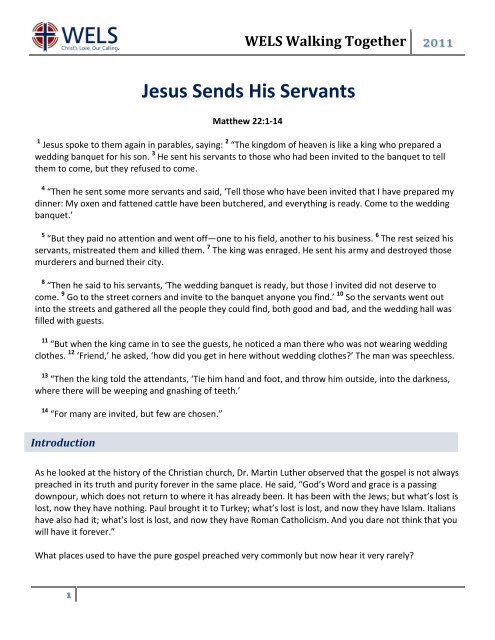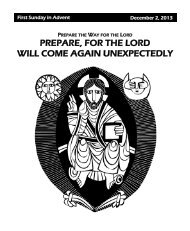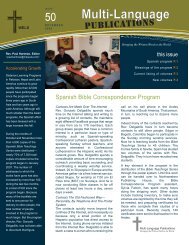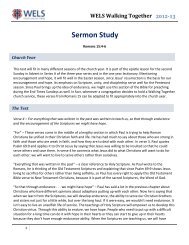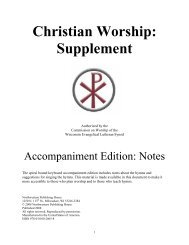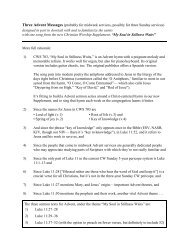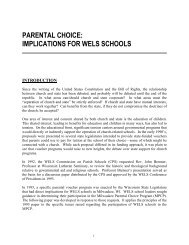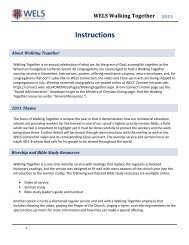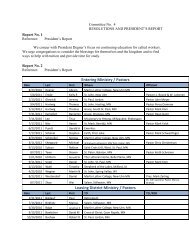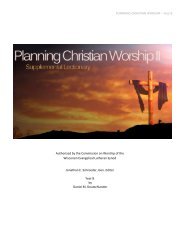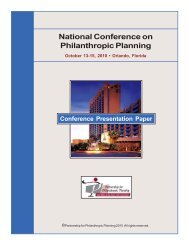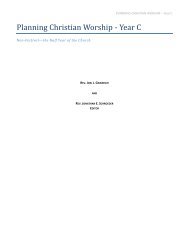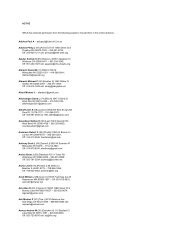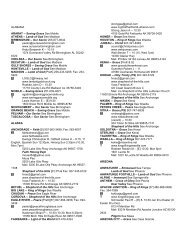Create successful ePaper yourself
Turn your PDF publications into a flip-book with our unique Google optimized e-Paper software.
WELS Walking Together<br />
Jesus Sends His Servants<br />
Matthew 22:1-14<br />
<br />
1 Jesus spoke to them again in parables, saying: 2 “The kingdom of heaven is like a king who prepared a<br />
wedding banquet for his son. 3 He sent his servants to those who had been invited to the banquet to tell<br />
them to come, but they refused to come.<br />
4 “Then he sent some more servants and said, ‘Tell those who have been invited that I have prepared my<br />
dinner: My oxen and fattened cattle have been butchered, and everything is ready. Come to the wedding<br />
banquet.’<br />
5 “But they paid no attention and went off—one to his field, another to his business. 6 The rest seized his<br />
servants, mistreated them and killed them. 7 The king was enraged. He sent his army and destroyed those<br />
murderers and burned their city.<br />
8 “Then he said to his servants, ‘The wedding banquet is ready, but those I invited did not deserve to<br />
come. 9 Go to the street corners and invite to the banquet anyone you find.’ 10 So the servants went out<br />
into the streets and gathered all the people they could find, both good and bad, and the wedding hall was<br />
filled with guests.<br />
11 “But when the king came in to see the guests, he noticed a man there who was not wearing wedding<br />
clothes. 12 ‘Friend,’ he asked, ‘how did you get in here without wedding clothes?’ The man was speechless.<br />
13 “Then the king told the attendants, ‘Tie him hand and foot, and throw him outside, into the darkness,<br />
where there will be weeping and gnashing of teeth.’<br />
14 “For many are invited, but few are chosen.”<br />
Introduction<br />
As he looked at the history of the Christian church, Dr. Martin Luther observed that the gospel is not always<br />
preached in its truth and purity forever in the same place. He said, “God’s Word and grace is a passing<br />
downpour, which does not return to where it has already been. It has been with the Jews; but what’s lost is<br />
lost, now they have nothing. Paul brought it to Turkey; what’s lost is lost, and now they have Islam. Italians<br />
have also had it; what’s lost is lost, and now they have Roman Catholicism. And you dare not think that you<br />
will have it forever.”<br />
What places used to have the pure gospel preached very commonly but now hear it very rarely?
WELS Walking Together<br />
Germany might come to mind immediately. The birthplace of the Reformation has a very small number of<br />
congregations still preaching the gospel in its truth and purity.<br />
The Scandinavian countries in Europe have a similar history.<br />
<br />
<br />
Many countries in the Middle East used to have flourishing Christian communities. Now Islam and Christian<br />
churches with a lot of false doctrines dominate the religious scene there.<br />
Some people might think that the U.S. is such a place. It is probably true when the doctrinal decline of the<br />
Lutheran Church – Missouri Synod is taken into consideration.<br />
In what places is the pure gospel being preached more often these days?<br />
Africa is still our fastest growing mission field.<br />
The Christian church is growing most quickly in Korea.<br />
Reliable statistics are more difficult for China, but it is clear that our own mission efforts there are being<br />
blessed in an exciting way.<br />
Jesus tells a parable that presents God’s perspective on the preaching of the gospel in different places to<br />
different people. Matthew 22:1-14 records that parable.<br />
Part I: The Message: God Prepares a Banquet<br />
Read Matthew 22:1-4 – The Message Is Prepared<br />
1. Not every detail in a parable is meant to be interpreted, but it is easy to identify the message God is<br />
preparing.<br />
a. Who is the king in the parable?<br />
God the Father is King over all, and wants us to celebrate what his Son has done.<br />
b. Who is the son in the parable?<br />
The Son of God has accomplished our salvation, and the church celebrates its relationship with him as<br />
a bride beautifully prepared for her husband (Ephesians 5:25-27).<br />
c. What is the wedding banquet?<br />
Isaiah 25:6 identifies worship activities as a banquet. We think of the Lord’s Supper. The <strong>Bible</strong> also<br />
talks about hearing and speaking the Word of God as eating it (Ezekiel 3, Revelation 10).<br />
2. A Lutheran hymn writer, Martin Franzmann, used this parable as the basis for a hymn, “O Kingly<br />
Love” (Christian Worship 335). In stanza two, printed below, how does he summarize the message?
WELS Walking Together<br />
<br />
O lavish Love, that didst prepare A table bounteous as they heart That men might leave their puny care<br />
And taste and see how good though art, This day we raise Our song of praise, Adoring thee, That in the<br />
days When alien sound Had all but drowned Thine ancient, true, and constant melody, Thy mighty hand<br />
did make a trumpet none could silence or mistake; Thy living breath did blow for all the world to hear,<br />
Living and clear: The feast is ready; come to the feast! The good and the bad, Come and be glad! Greatest<br />
and least, come to the feast!<br />
A bounteous table. Taste and see that God is good. The feast is ready; come to the feast!<br />
Read Matthew 22:3-9 – The Servants Are Sent with the Message<br />
1. What do the servants have to know to be faithful messengers?<br />
• The king has prepared a banquet.<br />
• There is a reason for the banquet: the son is getting married.<br />
• The banquet requires an invitation.<br />
2. Why do some people reject the invitation?<br />
Their home life, and especially their work life, is more important to them. They do not like the servants<br />
sent to issue the invitation. These actions prove that they do not deserve the invitation.<br />
3. Why do people reject the invitation today?<br />
Their home life, and especially their work life, is more important to them. They do not like the servants<br />
sent to issue the invitation. They change the message to match what makes more sense to them,<br />
which usually involves our doing something to deserve to go to the banquet.<br />
4. How does stanza four of “O Kingly Love” describe the reasons for rejection of the message?<br />
O holy Love, thou canst not brook Man’s cool and careless enmity; O ruthless Love, thou wilt not look On<br />
man robed in contempt of thee. Thine echoes die; Our deeds deny Thy summoning: Our darkling cry,<br />
Our meddling sound Have all but drowned That song that once made ev’ry echo ring. Take up again, oh,<br />
take the trumpet none can silence or mistake, And blow once more for us and all the world to hear, Living<br />
and clear: The feast is ready; come to the feast! The good and the bad, Come and be glad! Greatest and<br />
least, come to the feast!<br />
Part II: The Banquet Itself<br />
Read Matthew 22:10-14.<br />
Cool and careless enmity. Man robed in contempt of God. Our deeds denying the Lord’s summoning.<br />
Our own darkling cry and meddling sound.
WELS Walking Together<br />
1. The ultimate banquet with God is eternity with him in heaven (Revelation 7:16). How can both<br />
“good and bad” people be in heaven?<br />
<br />
<br />
We don’t get to heaven based on what we do. We go to heaven simply through faith in Jesus as our<br />
Savior.<br />
2. Why do we need wedding clothes when we are in heaven?<br />
None of us is pure enough to go to heaven. We need to be clothed in the righteous robes of the Savior<br />
to spend eternity there (Galatians 3:27).<br />
3. The point of the parable is not that a person could get kicked out of heaven. The point is that our<br />
being in heaven is based on something that God has given us, not anything we have done. What<br />
great comfort do these verses give to you? To your church? To your synod?<br />
The comfort that we receive here as individuals, churches, and as a synod is that our salvation is<br />
based on Jesus, not on anything we ourselves, our church, or our synod has done.<br />
4. How does the writer of “O Kingly Love” capture the certainty of our salvation in stanza one?<br />
O kingly Love, that faithfully Didst keep thine ancient promises, Didst bid the bidden come to thee, The<br />
people thou didst choose to bless, This day we raise Our song of praise Adoring thee, That in the days<br />
When alien sound Had all but drowned Thine ancient, true, and constant melody, Thy mighty hand did<br />
make a trumpet none could silence or mistake; Thy living breath did blow for all the world to hear, Living<br />
and clear: The feast is ready; come to the feast! The good and the bad, Come and be glad! Greatest and<br />
least, come to the feast!<br />
Part III: Application<br />
God keeps his ancient promises. He chooses to bless us. His melody is ancient, true, and constant.<br />
No one can silence or mistake his trumpet.<br />
Discussion Questions for Matthew 22:<br />
1. Many of the people of Israel, who heard the promises and invitation of their God, rejected the<br />
Savior and his invitation to the wedding banquet. What assurance do we have that our<br />
congregations and synod will remain faithful to the truth?<br />
God has kept us faithful by his grace, and we need to rely on that grace to keep us faithful, not on any<br />
of our own activities. By nature we have no assurance that we will remain faithful. In fact, by nature,<br />
we do not deserve to be invited to the banquet. When things distract us from the Word and promise of<br />
God, we need to repent.
WELS Walking Together<br />
<br />
2. The purpose of pooling our resources as a synod is to train the king’s servants and then send them<br />
out. What should we expect them to do?<br />
Primarily, invite people to the wedding banquet of the Lamb. Everything else is secondary.<br />
3. Agree or disagree? The Wisconsin Synod is doing a good job of inviting people to the king’s wedding<br />
banquet.<br />
Agree. The Wisconsin Synod is training its students in the truth and purity of God’s Word, making the<br />
gospel the center of everything we do. We are doing mission work in many countries around the world<br />
in many different languages.<br />
Disagree. There are many opportunities for speaking the gospel to which we cannot respond because<br />
we do not have the resources. We are tempted to prioritize our economic prosperity above the gospel.<br />
4. How does the hymn writer capture the urgency of our work as a synod in stanza three?<br />
O seeking Love, thy hurrying feet Go searching still to urge and call The bad and good on ev’ry street To fill<br />
thy boundless banquet hall. This day we raise Our song of praise Adoring thee, That in the days When<br />
alien sound Had all but drowned Thine ancient, true, and constant melody, Thy mighty hand did make a<br />
trumpet none could silence or mistake; Thy living breath did blow for all the world to hear, Living and<br />
clear: The feast is ready; come to the feast! The good and the bad, Come and be glad! Greatest and least,<br />
come to the feast!<br />
Hurrying. Searching still to urge.


